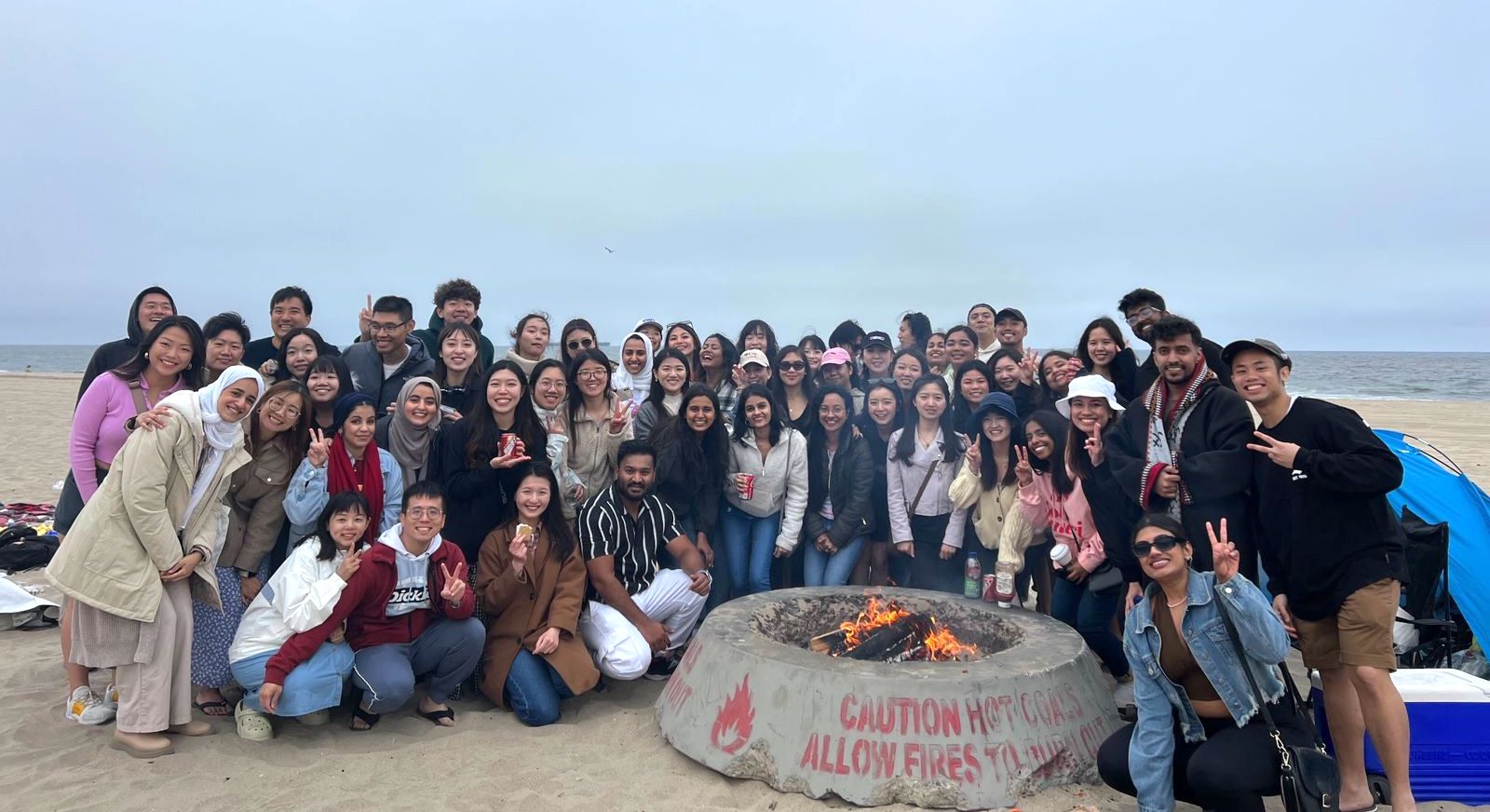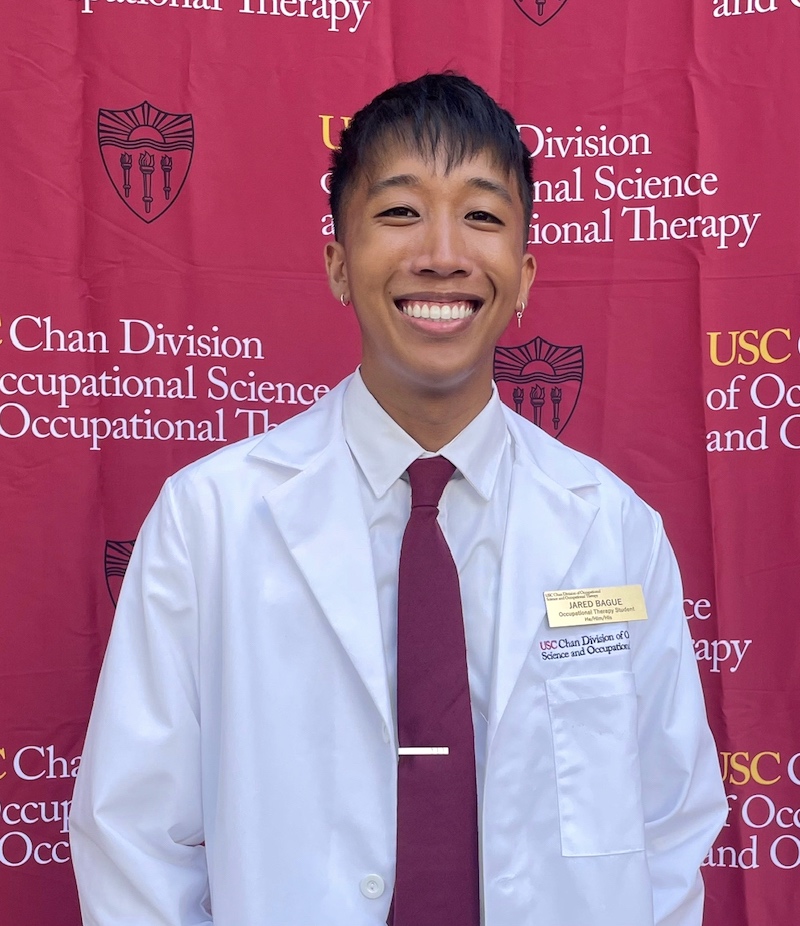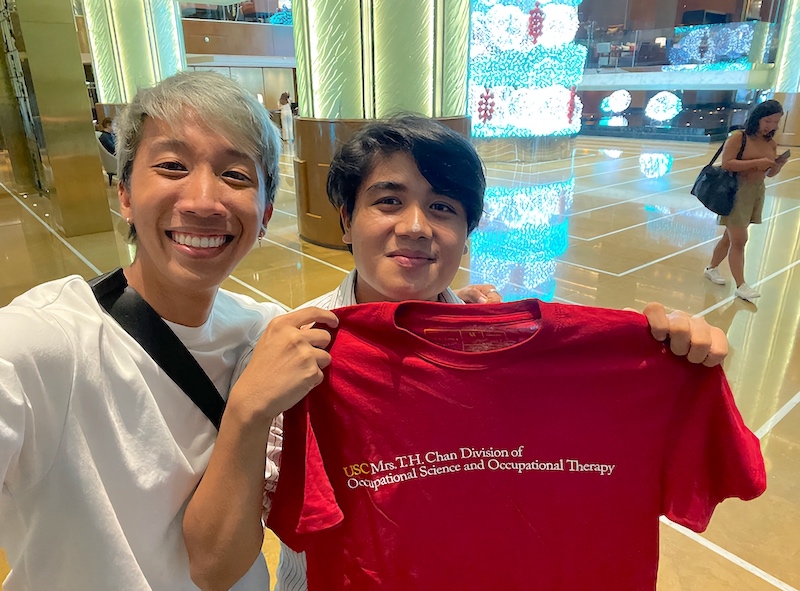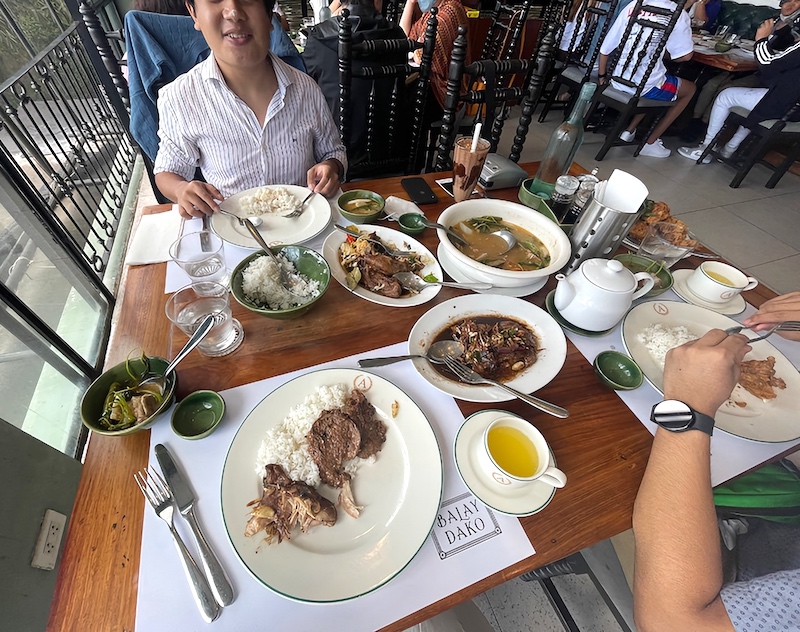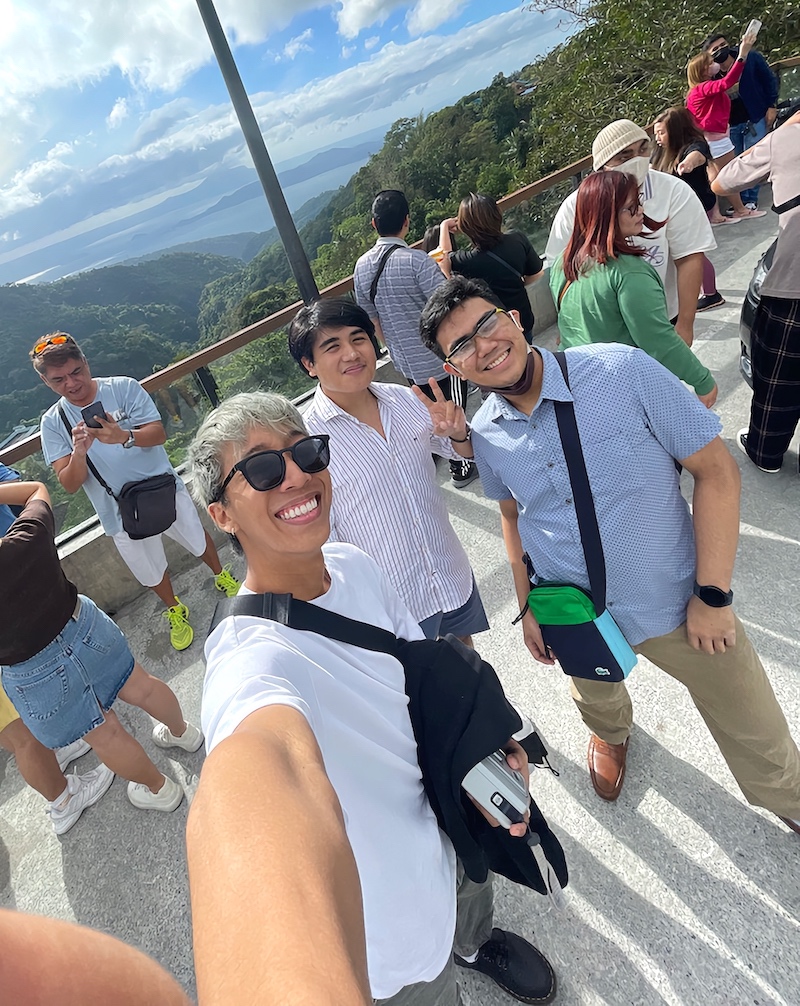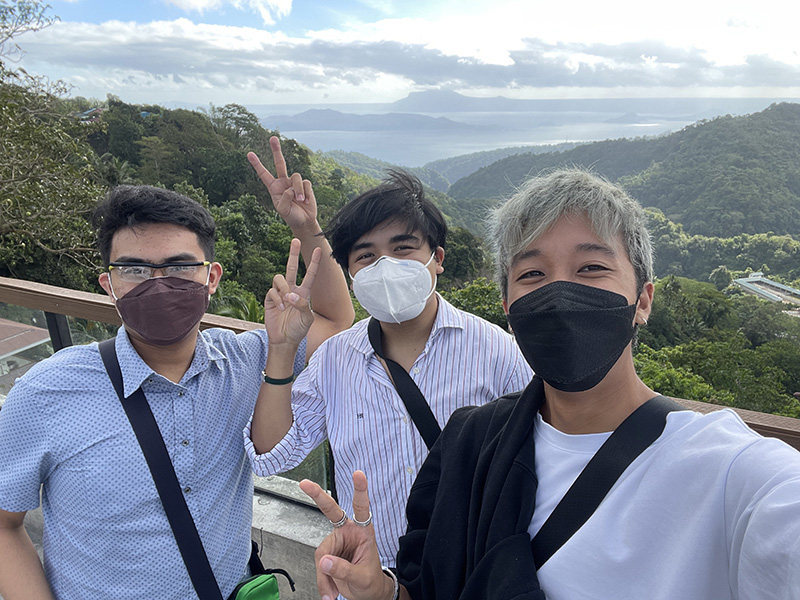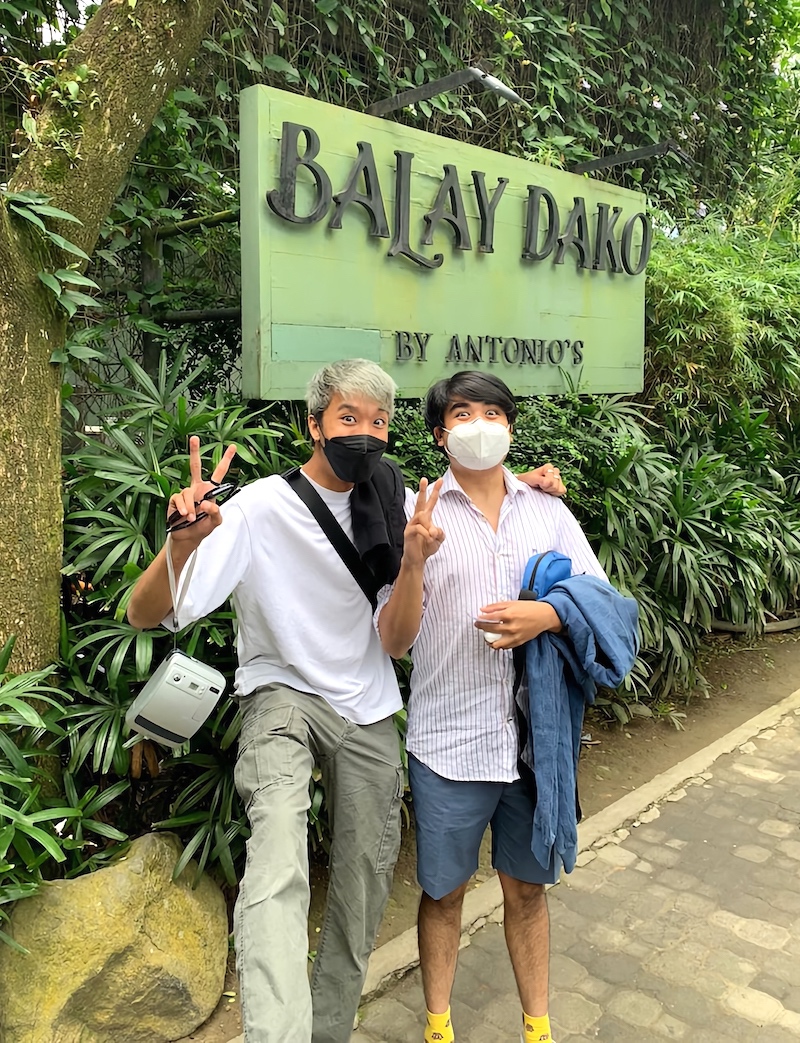Student Blog
International
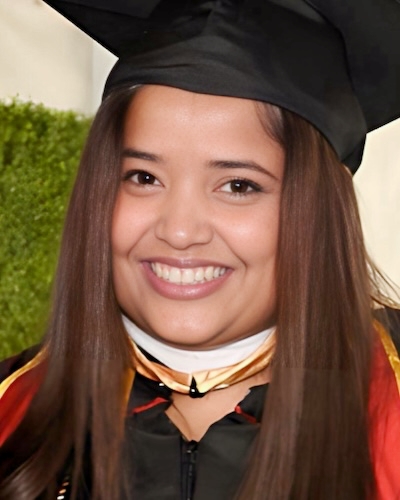
From Curiosity to Commitment: A 7-Year Quest to Unveil the Essence of OT ⟩
February 5, 2024, by Sheryl
International What are OS/OT?
As I introspect upon my journey as a pedagogy resident and doctoral student in the Post-Professional OTD program here at Chan, I reignite my glowing passion for occupational therapy and hope to do so for you.
Despite creating so many elevator pitches summarizing an answer to the question ‘So, what is Occupational Therapy?’ I still struggle doing that question justice. Among many stories that contributed to choosing my path to becoming an OT was the story of a younger version of me yet to discover occupational therapy.
It was at the age of 17 in high school where I would first hear about Occupational Therapy. One of my electives in high school created an opportunity to observe a Special Education School. It was here where I would continue to meet the most resilient and brilliant children whose diagnosis did not hinder their potential and a team of teachers and physical therapists working effortlessly to create a safe space for them to flourish. There was a need for OTs that echoed in those corridors that I notice now, and after a very invigorating experience, I proceeded to request to meet with one of the physical therapists at the school. She spoke to me about this famously untapped potential of Occupational Therapy and the very growing need for OTs. That was the conversation that brought me to my very first ‘So, what is occupational therapy?’ which would then go on to launch my dream of becoming an occupational therapist.
As my vague goals shaped into specific inquiries, my curiosity became insatiable. After extensive research about Occupational Therapy, I began to comprehend how this field was truly radical.
That day, this younger version of me in my home in Riyadh, Saudi Arabia would go on to make a road map of my life with a list of OT schools all around the world with the only intention to learn the most so that she could answer her first burning ‘So, what is occupational therapy?’ I remember sticking that piece of paper on the mirror of my dresser.
It has since been 7+ years of OT school, 7 World OT days, 3 degrees in Occupational Therapy and an unquenched thirst to fathom the true power of occupational therapy and repeatedly answer that same question passionately.
After graduating from the Post Professional Master’s (PP-MA) program at USC, my inquisitive mind continued to implore me to gather knowledge about academia, the curriculum and understanding the potentiality of Occupational Science and Occupational Therapy. I hope to contribute to the lineage of excellence at the Division and propagate the importance of Occupational Therapy as a Post-Professional OTD student here at USC Chan. This remains my driving force as I add another pit stop on the road map I created 7 years ago.
⋯
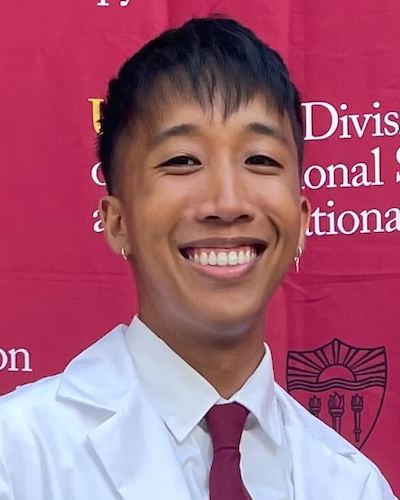
Finding My Calling: Journey to Occupational Therapy from the Heart of the Philippines ⟩
January 25, 2024, by Jared
Diversity International
Six years ago, I strolled along the dirt road with my mom and sister to visit the province in the Philippines where my relatives still live. Around me were homes made of crumbling concrete and tarped roofs, and fences made of plastic water bottles. Kids were running around barefoot and the broken eyes of titas and titos were trying to sell the last of their produce for the day. But behind the exterior of hardship, the Filipino culture was alive and well. Children danced traditional Filipino dances, elders played rich music once played by their ancestors, and lolas sang to the whole province on their outdated karaoke machines. The sight of a colorful culture thriving despite the poverty that surrounded my own people was not only inspiring, but life-changing in terms of my future goals of being an occupational therapist.
Occupational therapy is still in its early stages of development in the Philippines. Upon our visit to the therapy clinic where my aunt worked, I observed a modest setting — a plain room with limited equipment — where therapeutic interventions were provided to a diverse range of Filipinos. As I watched therapists treat patients, I remember feeling deeply troubled watching a young man who needed maximum assistance to move a rock from one area on a table to another. But even more so, I noted that these rudimentary interventions could be transferable and more widely used.
My aunt shared insights into the challenges faced by many individuals in the Philippines who struggle to resume their regular routines after experiencing physical disabilities. This difficulty arises from the inadequate access to proper care in medical facilities. The combination of impoverished living conditions and a shortage of occupational therapists contributes to a scenario where preventable disabilities go untreated.
Initially, I found her statements perplexing, especially considering that the interventions observed involved simple materials such as rocks, cups, and paper. However, upon reflection, I came to understand the larger issue at hand. The simplicity of the therapeutic materials highlighted not only a lack of awareness about occupational therapy in the country but also a lack of advocacy. This gap was particularly evident in impoverished areas, including my family’s province, where individuals faced challenges accessing essential rehabilitative services.
Although my experience at my aunt’s clinic in the Philippines was brief, it left a lasting impact on determining the focus in my future occupational therapy career. As someone who is constantly inspired by the beauty of my own culture, I realized that I wanted to help people carry on traditions that gave them purpose, whatever their background. In undergrad, I adopted a Philippine Studies minor and served on the executive board of Kasamahan, the University of San Francisco’s Filipino cultural organization — this has given me a holistic perspective of how people’s engagement in their culture can deeply affect their quality of life. These experiences solidified my desire to give client-centered interventions that help the individual stay as connected to their occupations as possible, whether they are cultural or not.
Equally important, I want to use my awareness of negatively perpetuated systems in both the United States and Philippines to advocate for the profession and bring awareness to the field. From the occupational therapists that I have shadowed under during fieldwork and volunteering, I’ve learned how simple yet life-changing interventions can be. From analyzing post rotary nystagmus in children on the Autism spectrum to teaching older adults how to safely ambulate with a walker, my experiences have challenged me to explore how interventions can be transferred to communities that are in need of our services.
In developing nations like the Philippines, there is potential to further advocate and educate about occupational therapy to enable individuals to actively consider it as a valuable therapeutic option.
I hope to bring my passion and future knowledge of occupational therapy to the Philippines and eventually be an educator for future generations. This is in hopes that we can reform health care policies to accommodate those from lower socioeconomic classes and render needed professional service.
Through occupational therapy, I have the opportunity to apply the underlying practices and values of the traditions that I hold dear to my heart. My experience in the Philippines, a developing nation rich in cultural tradition has made me appreciate the sacredness as well as the practicality of healing and movement. I am profoundly motivated to help others share this view and work as agents of positive change in the world.
⋯
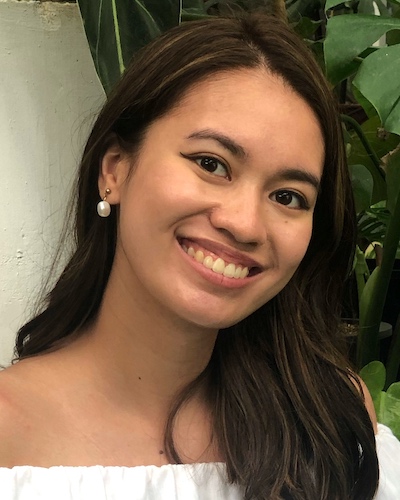
A Tribute to Open Mic BBQs, Swiftie Listening Parties, & Mid-Class G.I. Snack Runs ⟩
May 1, 2023, by Mika
Community International School/Life Balance
Hello everyone!
It’s been a while since I last wrote a blog and I can’t believe it’s my last one! Bittersweet as it is, I want to dedicate this post to my classmates in the Post-Professional Master’s program — the wildest, most spontaneous, and the most generous set of people who I’m proud to have gotten to know the past 9 months.
To MA-1 Batch 2023,
Looking back at our first week of orientation, we were all a bunch of new faces filled with excitement and hints of anxiety for a new adventure in a new country. I remember how it was a struggle to remember all 50 names despite the x number of times we had to introduce ourselves in each class. I love that now I can recall everyone’s name and associate a special memory with each one of you!
One of my favorite memories was welcoming the school year with our summer barbeque party in the OT house. I loved getting to know all of you and I really appreciate the energy you all brought in with the activities and games prepared for us. I will definitely not forget when we turned the party into an open-mic night where everyone sang songs from their country and even tried to get our program director to sing with us. I think we love singing so much as a class that some of us even spent 6 hours of non-stop karaoke together!
As the Fall and Spring semesters progressed, I loved getting the opportunity to work with all of you and learn more about the OT practice in your respective countries. I loved how we all resonated with many common issues we as OTs faced (check my past blog: 10 Things I Hate About Occupational Therapy) and it somehow felt like I was in the same boat with people who understood and validated what I was feeling and going through. As how we say it in Filipino, I had a “kakampi” (teammate) to go through and navigate these issues in practice. I felt this not only with the similar concerns we had about the OT practice, but also with all the requirements and exams we have gone through as a class. I will miss looking back at anyone during class when I hear sounds of crumpled plastic since I know someone is opening food to share with everyone. I will also definitely miss having someone ask me, “Let’s go to Global Initiatives” to say hi to the staff there while we search for snacks.
Aside from learning each of your practice in your respective countries, I also loved learning each of you as individual persons! I love how some of us made a Taylor Swift cult and had a listening party at midnight for her latest album. Remember when we teamed up together to battle the rest of America to successfully get tickets for her concert? That was one of my favorite memories from that semester. I also love how I was able to share my love for Korean drama and Korean oppas with some of you, sharing when they have their recent posts up or trying to help each other find them when they visit LA.
I also appreciate everyone for being so down to help each other get through life in LA, whether by offering a ride or by offering their place to host some hangouts (shoutout to the MA1 House)! I really appreciate your generosity and I am so grateful I got a lot of weekend memories to remember — baking, going to Dockweiler beach, searching for good coffee in Silverlake, traveling to the Grand Canyon, celebrating Lunar New Year, or simply just hanging out.
Soon we’ll all be separated again and we will all be in our different paths but wherever you guys go, I hope you all remember that there will always be this loud and enthusiastic Filipina always cheering you on!
I want to end my blog with a quote I found online in Pinterest that encompasses what you guys mean to me:
“One day all of us will get separated from each other; we will miss our conversations of everything and nothing; the dreams that we had. Days will pass by, months, years until this contact becomes rare. One day our children will see our pictures and ask: ‘Who are these people?’ And we will smile with invisible tears because a heart is touched with a strong word and you will say ‘It was them that I had the best days of my life with.’”
أحبك
我愛你們
사랑해요
Te amo
मुझे तुमसे प्यार है
Mahal ko kayo!
Until we meet again! 🫶
⋯

These Are A Few Of My Favorite Things ⟩
January 21, 2023, by Mika
Housing and Transportation International Life Hacks Living in LA School/Life Balance
Hello again and Happy New Year, my friends!
I wanted to start off the year with a blogpost about one my favorite childhood songs from the movie, The Sound of Music. If you have watched the movie, you might have remembered the scene where Fräulein Maria comforts the children amidst a storm. She tells them (or rather, sings to them) that whenever she feels scared or sad, she remembers her favorite things to help herself cheer up. Now, as a material girl, I kind of used this coping strategy as well to help me adapt to life here in Los Angeles. With that, I present to you some of my favorite things or must-have’s that helped me the past months.
1. Water Filter Pitcher
Moving to a new country requires you to find ways on how locals get their basics, like food or water. Based on the suggestions of some friends and family living in the States, they recommended me to get the Brita water filter pitcher. So far, I don’t have any problems with this brand that I bought; however, you can also opt to buy cheaper brands. These water filters also come in different sizes (even in a dispenser) and are available in local supermarkets like Target and Walmart.
2. Tide Pods
This has been a game changer for me doing laundry since it makes everything more efficient and quicker. This was not a common product back at home so when I discovered this, I really felt like a caveman discovering new technology.
3. Sink Garbage Disposal Unit
Okay, this device got me shouting U.S.A., U.S.A.! to my friends back at home LOL. Again, we don’t have this technology so I was happy to discover this in most American households since it made washing the dishes more convenient.
4. Air Fryer
This is not new technology for me but it definitely helped me save time in cooking meals in between studying. Shoutout to my lovely roommate for sharing this with all of us in the apartment!
5. Tabo (Dipper)
The Filipino in me is definitely showing with this one. I definitely cannot do my self-care occupations or other household chores without my beloved tabo or dipper. Although you can purchase these through Amazon or in Filipino supermarkets, I was able to buy a portable one (it was made of a rubber-like material so I could fold it to fit in my luggage) back home in the Philippines.
6. Dustpan
From what I understand, most locals use vacuum cleaners to clean their floors. However, I like to go Filipino old school and use a broom and a dustpan to clean some of my floors. For those who prefer cleaning this way like me, I wanted to share that I bought a detachable dustpan back at home and brought it here since most of the dustpans here were hand-held and quite-small, which often triggered my back pain when cleaning.
7. Mobile Applications
I found several mobile applications that had made my stay here in L.A. more convenient. Here are a few I found helpful:
- Ride-sharing apps like Uber and Lyft
- Public transportation apps like Transit and Tap
- Online shopping apps like Amazon (As a student, you can get Amazon Prime for free for 6 months!)
- Food and grocery delivery apps like Door Dash, Uber Eats, Amazon Fresh and Wee! (an Asian grocery delivery application)
- Yelp to find recommendations of places to eat around the area
- USC Gateway mobile app to help you know everything that’s happening in campus and to navigate your university life
8. Gifts (and snacks!) from home
Moving out of your comfort zone to a new country will bring about bouts of homesickness and loneliness from time to time. That is normal — it’s okay not to feel okay sometimes! To help me get through those moments, I’m blessed to have a good set of family and friends who sent some gifts and snacks to help me remember home. It definitely also helped that social media made keeping in touch with them possible!
And that’s the end of my list! What about you, what are your favorite things that get you by?
⋯
16 Hour Flight to Hang Out With my Occupational Therapy Pen Pal ⟩
January 4, 2023, by Global Initiatives Team
Getting Involved International
By Jared Bague (he/him), OTD ’25
Edited by Christelli Carmona, Entry-Level Professional Master’s student
There is a certain charm and chaos that comes with the final days of the year — the simple change of a single digit after 365 days sends people into a frenzy of ending the calendar year living life to its fullest. I would be remiss if I didn’t admit that I too subscribed to this “final frenzy” by meeting up with my pen pal . . . that lives on the other side of the world.
In October of 2022, Global Initiatives announced that they were organizing a “Global Pen Pal Program” where they connected USC Chan students with other OT students from around the world. With OT schools spanning South Korea, Palestine, Poland, and more, the Global Initiatives team matched Chan students to OT schools abroad according to their interests found in their application. For me personally, I’ve always felt a deep calling to be a bridge for the dissemination of knowledge in a place where my roots run deep — the Philippines.
A few days after I submitted my application, I was overjoyed to see that I was paired with the University of Santo Tomas in Manila, Philippines. Even more so, I was excited to see that my roommate, Joseph Quiambao, was also paired with the same school. After we shared a few embarrassing cheers of excitement in our living room, I received my first email from my pen pal, Jose Maria Miguel Burgos (Miggy for short). We immediately began emailing back and forth introducing ourselves, which eventually evolved into direct messaging each other on Instagram, which eventually evolved into Zoom calls. Despite the 16-hour time difference, Miggy and I’s friendship grew quickly over the span of 2.5 months.
Prior to applying for the Global Pen Pals program, I was planning on taking my first international solo trip to spend New Year with my grandma in Sison, Philippines. In full honesty, the idea of navigating the stresses of international travel by myself was deterring me from following through with my plans. But after thinking about the possibility of having a once-in-a-lifetime opportunity to meet up with my pen pal, I knew I had to book the 15-hour flight. I pitched the idea to Miggy and Ray Torres (my roommate’s pen pal who I also got to know), and they were on board. After a few weeks of planning, we all settled on meeting up on December 28th.
It was only when I was surrounded by hundreds of balikbayan boxes (gifts that overseas Filipino families send home to the Philippines) at LAX that I realized how crazy of a plan this was. I began thinking to myself, “Jared, you just spontaneously booked a solo flight overseas to meet up with someone you had only seen the upper half of on Zoom.” But as the great philosopher, Drake, once said, “. . . you already know though. You only live once, that’s the motto.” With that song on repeat in my head for the entire duration of the flight, I finally touched down at Ninoy Aquino International Airport on December 27th.
At 7:00 am on December 28th, Miggy and his childhood friend, Raffy, picked me up from my hotel in Bonifacio Global City. We went on a short road trip to Tagaytay where they took me to their favorite food spot, and then we headed back towards Makati where we grabbed coffee, went sightseeing, and shopping.
Miggy experienced my first taste of “sinigang na baboy” and “puto bong bong,” which are Filipino dishes.
Our first stop in Tagaytay was this lookout point. Tagaytay is located an hour and a half outside of Metro Manila.
Apart from the amazing views, food, and shopping malls, the part that I enjoyed most was the conversations we had in our downtime. I got to learn a lot about Miggy — he is a big fan of Florence Clark and Erna Blanche, and he eventually wants to work in the mental health setting as a life coach, he and Ray Torres put on “Camp Kabahagi” which aims to enable children with disabilities through play, and so much more. While talking about our passion for OT, I was able to see how different yet similar the profession looks in our own respective experiences as OT students in different countries. We shared moments where we talked about Sensory Processing, therapeutic use of self, dysphasia, and other OT-related topics that sparked our interests. Overall, it was inspiring to witness OT students outside the United States sharing the same desire to make a difference in the world, one intervention at a time.
Going to Tagaytay was a special experience because Miggy and Raffy expressed how COVID has restricted them from leaving their houses too often.
The “final frenzy” that I experienced led to me gaining a deeper understanding of the global community that we, as future OTs, are a part of. It is easy to forget that there are OTs around the globe that share the same hopes and dreams that we do — I find it quite beautiful. Once we set sail in our curiosity to learn more about OT beyond the borders of our own country, we can experience an exchange of knowledge that propels the profession forward. This is in hopes that OTs around the globe can provide the best quality care that we can as future practitioners.
In regards to my pen pal, Miggy, I know this isn’t the last time I will see him. His dream is to eventually attend USC Chan to pursue his PhD but until then, I’ll make sure to make a stop in Makati whenever I find myself in the Philippines again.
⋯






